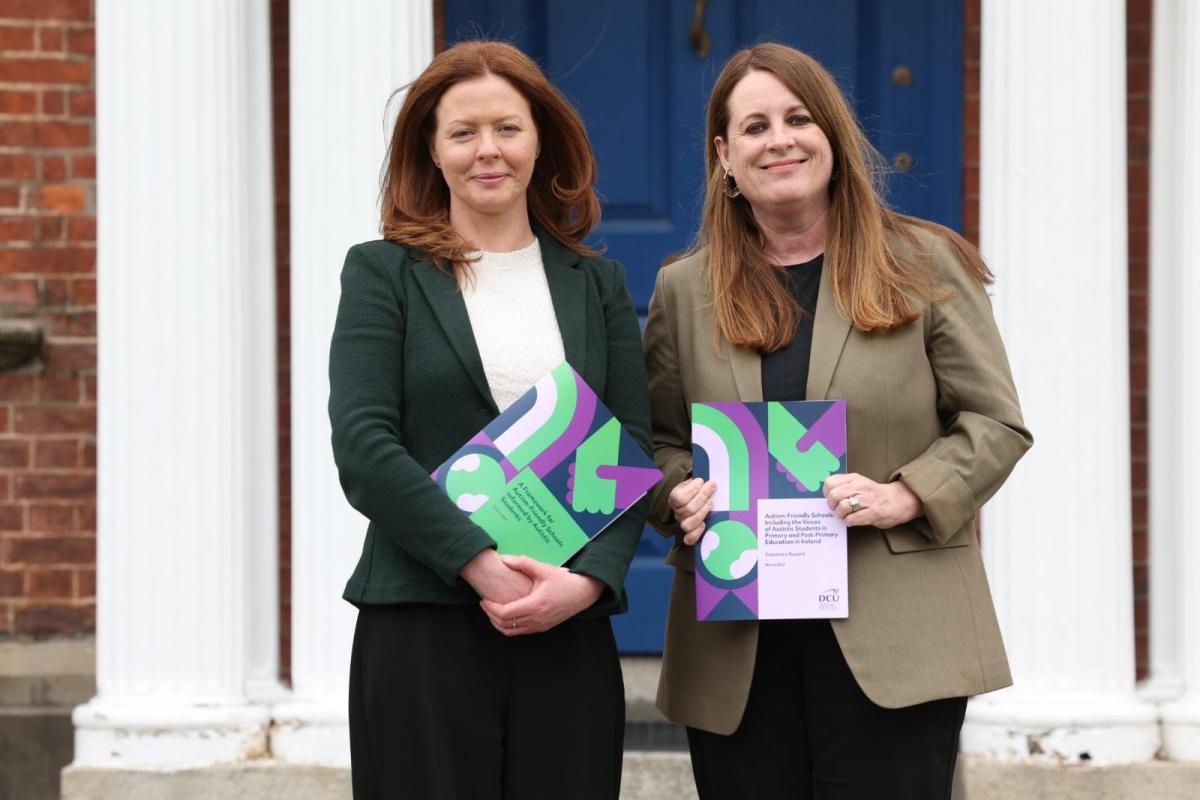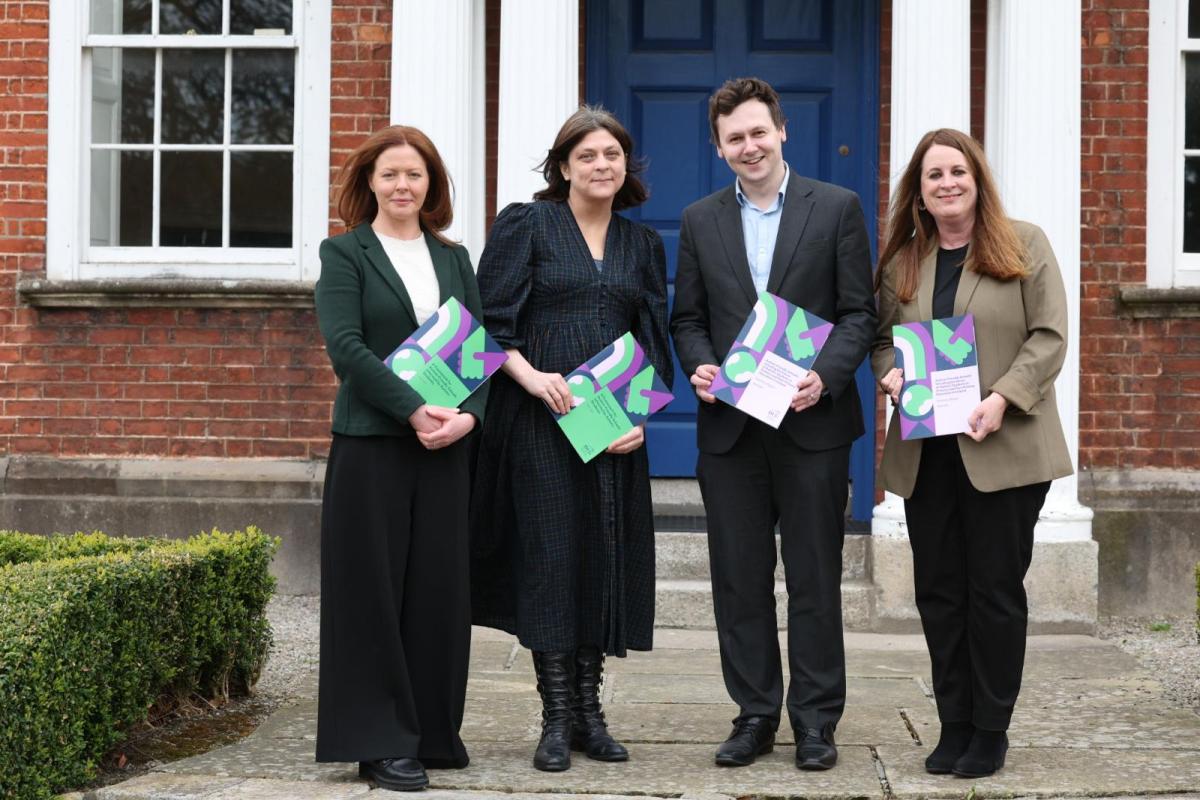

Individualised supports for autistic pupils in primary and secondary schools critical for their inclusion - DCU report
A new study conducted at the Dublin City University’s Institute of Education on the experiences of autistic pupils in both primary and secondary schools in Ireland has found that individualised supports and accommodations are critical for their inclusion.
Results from Autism-Friendly Schools: Including the Voices of Autistic Pupils in Educational Provision in Ireland showed that autistic students’ experiences at school varied substantially based on the level and quality of support they received. Children who received more support reported more positive experiences at school. It also found that relationships with their teachers was ‘make-or-break’ for most autistic children and young people. The relationship was so pivotal to autistic students that there were seldom any neutral feelings towards teachers.
In the wider school community, measures of understanding of autism and attitudes to inclusion showed good understanding and positive attitudes to inclusion among teachers, Special Needs Assistants and parents. However, only one in four parents, and just over one third of teachers, viewed the Irish education system as fully inclusive.
Led by Dr Sinéad McNally, Associate Professor at DCU’s Institute of Education, and Prof Mary Rose Sweeney, Professor and co-lead at the Royal College of Surgeons in Ireland, the study team interviewed autistic children and young people and their parents, reporting on the school experiences of over 50 autistic students across Ireland. Over 650 parents and teachers across 45 schools also took part in a survey on attitudes to inclusion in the wider school community.
The study is being launched at an event on DCU’s St. Patrick’s campus today (Wednesday 26 March) by the researchers.
Key Findings
Primary Schools
- Children often referred to aspects of a teacher’s affect when describing their current or previous teachers, including tone of voice, demeanour, and emotions. Kindness emerged as a key positive attribute of teachers, with teachers needing to be attentive and proactive in providing support.
- Children’s relationships with their teachers were “make-or-break” – the relationship is so pivotal that there were seldom any “neutral” feelings towards teachers.
- The provision of authentically individualised supports and accommodations were highlighted as important for autistic children.
- The importance of friendships in fostering a sense of belonging at school was clear. Many children described difficulties connecting with their classmates and finding shared interests.
- Homework was noted as a significant stressor for autistic children.
- The physical school environment also played a significant role in whether autistic children felt supported to fully participate in their school. Children identified the classroom set-up, the availability of sensory rooms and quiet spaces, and consideration of the outdoor space as important for inclusion.
Secondary Schools
- Autistic young people reported experiences of subtle inclusion and exclusion. Equal versus equitable treatment was a common theme with autistic young people describing neurotypical expectations (academic, etc); lack of flexibility from school & teachers regarding school rules. Schools appeared to be reluctant to provide supports or make changes to accommodate individual students.
- Young people spoke of the discomfort that can arise when attention is drawn to them (the spotlight effect).
- Exclusion was a significant theme in the post-primary cohort, with young people highlighting a fear of exclusion and being discriminated against and stigmatised.
- The sensory experience was also a very vivid theme for autistic post-primary school students. Uniforms were described as itchy and uncomfortable. Pupils expressed the need for greater flexibility around uniform policies, with many recommending the removal of uniforms entirely.
- Sensory overload was an issue raised for many students (noise, lights, scent etc.)
- School rules and structure were important for students. Timetabling of breaks, access to lockers and ensuring time to eat and go to the toilet were changes that students highlighted as helpful.
- The impact of peers and staff was also evident in how much autistic students participated in school. Bullying was reported as an issue, particularly among girls.
Findings from the Wider School Community
- Only one in four parents, and just over one third of teachers, viewed the Irish education system as inclusive, highlighting serious concerns around the current provision of education for autistic children.
Recommendations
-
System-wide changes are required to ensure resources and structural supports are in place to facilitate inclusive practices in all schools. Staff resourcing and specialist in-class resources are needed.
-
The external policy environment should be compatible with inclusive developments in order to support rather than undermine the efforts of schools.
-
Education departments must provide leadership in the promotion of inclusion and equity as principles that guide the work of teachers in all schools
-
Policies should draw on the experience and expertise of everybody who has an involvement in the lives of children, including the children themselves
-
Culture of collaboration is needed for school development, developing inclusive schools involves the building of consensus around inclusive values within school communities.
Dr Sinéad McNally said
“Autistic children and young people in our study shared a wide range of experiences of school. Some reported thriving in school where they felt supported and valued. They spoke about wanting to pursue their interests in school, for these to be nurtured and for differences to be valued by teachers and classmates. However, many autistic students talked of exclusion and significant distress in school and this needs to be urgently addressed.
"Our findings indicate that proactive planning is needed for more inclusive physical environments in schools (such as softer lighting, quiet spaces within classrooms and the wider school), and individualised accommodations (including uniforms which were deeply uncomfortable for many autistic students) will be important for overcoming sensory barriers to school inclusion
"It is evident that system-wide change is needed to ensure that all schools are fully resourced to be inclusive of autistic children and young people. Small changes now can make a big difference to autistic students – small acts of kindness, meaningful accommodations, and nurturing special interests are just some of the ways that we can act to more fully include autistic students in schools in Ireland”.
Prof Mary Rose Sweeney, said
“The findings of our study have implications that should be considered by both policy makers and school management right across the country. We have produced a framework which can be adopted and implemented by schools nationally with little cost.
"These simple accommodations have the potential to change the lives of autistic children and adolescents, and schools should be encouraged to adopt them.”
About Autism-Friendly Schools: Including the Voices of Autistic Pupils in Educational Provision in Ireland
Funding for the study has come from Research Ireland’s COALESCE programme for interdisciplinary research stream which addresses national or global societal challenges.
The research was supported by AsIAm, Ireland’s National Autism Charity.
The study was guided by an autistic Child and Youth Advisory Group and a Stakeholder Advisory Group.
The authors of the study met with 43 autistic children and young people: 27 children from primary school and their parents and 16 young people from secondary schools. They also met with 51 parents. 32 boys and 19 girls took part in the study.
A survey was also sent to a randomly selected set of schools to capture their understanding and attitudes to autism.
Participants were 661 parents and staff members in selected primary, post-primary, and special schools across the Republic of Ireland.
The full report can be read here.
More details about the Autism-Friendly Schools project are available here.

